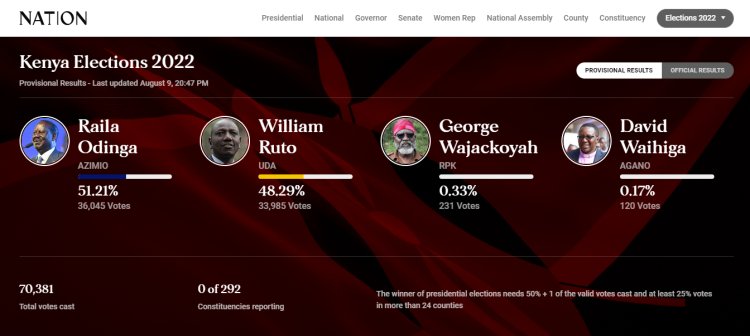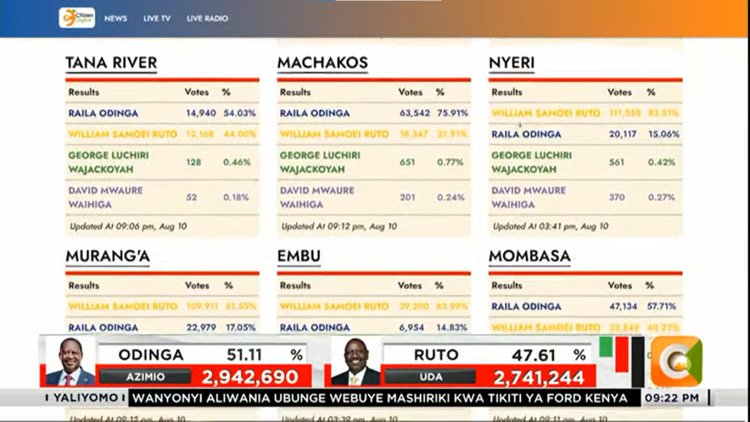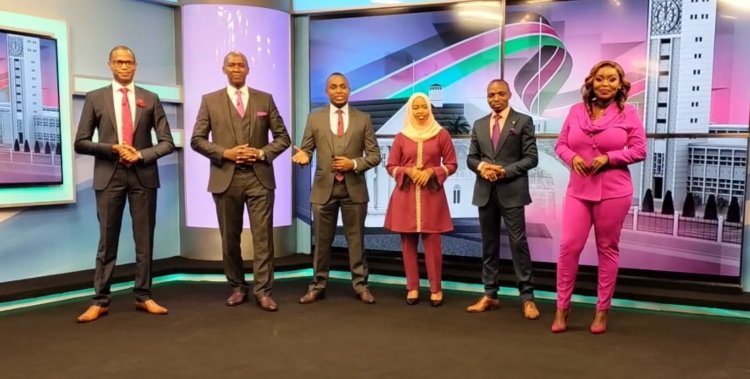Media Council To Save Kenyans Complaining About Different Presidential Results
Mainstream media houses and many digital media houses in the country have been providing provisional presidential results to members of the public

The Media Council of Kenya (MCK) has announced that it is working on an urgent solution to growing concerns raised by Kenyans regarding different provisional presidential results being streamed across TV stations and many digital media houses.
Mainstream media houses and many digital media houses in the country have been providing provisional presidential results to members of the public, though some media houses have been reporting numbers different from each other.
Since the vote tallying started on August 9, 2022, right after the closure of voting times, the Independent Electoral and Boundaries Commission (IEBC) availed a portal for Kenyans and media houses to access, though the astonishing numbers on screen and websites from different media houses have thrown members of the public into confusion.

Screenshot of Citizen TV streaming provisional presidential results. /YOUTUBE
MCK, in a statement on Wednesday, August 10, noted that it was consulting media owners and editors to find a way to provide synchronized results to Kenyans.
"Media Council has noted growing concern on the different election results being transmitted by media houses.
"The Media Council of Kenya is in consultation with Media Owners and Editors to find an urgent solution to this to ensure Kenyans receive synchronized results," the regulator stated.
Media houses in Kenya have been flexing their might in broadcasting provisional presidential results before the big announcement by the IEBC, though some of them have been revealing different leading positions of the top two candidates, Azimio La Umoja flag bearer, Raila Odinga and his main competitor Deputy President, William Ruto.
For instance, at the time of publication Royal Media Services (RMS)-owned Citizen TV, showed Raila leading with 2.9 million votes against Ruto's 2.6 million votes out of the 14.2 million votes that were cast on Tuesday.
Nation.Africa however had Ruto leading with 3.7 million votes against Raila's 3.5 million, out of the 7.2 million votes tallied and out of the 14.2 million votes cast on election day.
But the slow pace of results transmission was noticed by IEBC chairman, Wafula Chebukati, who encouraged the media to be more faster in transmitting their results given the ones being uploaded on the IEBC portal from the polling station were final.
"The media is behind in their tallying, they should have been at 98 per cent now. Maybe they were not prepared," he joked at the time, with spot checks on the portal showing 45,894 of 46,229 reported form 34As on the platform, which is a 99.28 per cent completion.
How Media Houses Transmit Presidential Results
Each media house has been getting Form 34As from the platform, curating them before broadcasting them on screen. However, some media houses have been faster than others in transmitting results due to their capability.
"The figures you see on the screen will keep going up, some media houses are faster than others, some are efficient," Citizen TV anchor, Yvonne Okwara had explained the technique of transmission, with punctuality and acute data analysis being the key to the different figures.
Her colleague, Trevor Ombija, seemed to have a different perspective as he showed off the station's capability to present figures more accurately and effectively.
"Some people have more data analysts and have state-of-the-art equipment," Ombija noted.
Nation Media Group-owned-NTV's journalist, Daniel Mwangi noted that their figures were based on Form 34As picked at random from all constituencies.
"It depends on random Form 34As being used, but we can't declare that these are the final results," Mwangi stated.
For the media, the gathering and distribution of news content round the clock is a demanding task given that this is an audience with access to multiple platforms and screens. To meet the needs of audiences in Kenya and abroad, media houses have planned for 24-hour news coverage until the day IEBC announces the winner of the presidential ballot.
It is especially daunting when one has to consider that there are 46,229 Form 34As to gather, process and distribute at a quick speed that even tires the IEBC.
In that regard, each media house has an established data centre with teams working round the clock to process the results. This includes manually downloading Forms 34A from all the polling stations as loaded in the IEBC’s portal and tabulating them.
Media houses also have to deal with trust issues, given that misinformation during the election period is at its peak. It is all about a slow but accurate process that will turn into credibility, which in periods like these can make or break a media house.

Frederick Muitiriri alongside other NTV Swahili anchors. /FREDERICK MUITIRIRI.NTV
This year has also had several opinion polls that have sparked emotions from both camps, with all eyes on the final results to vindicate whether the opinion polls helped or not.
To make the numbers simple and easy to understand, media houses are also devising creative ways to present the numerical content, both on TV and on radio as well as through online platforms. The key is creative storytelling.
However, making this content requires one to be keen and accurate, which is time-consuming. The election has also brought to full power the value of fact-checking and verification. Media houses thus have to be careful, especially against political factions that have deployed bloggers to suit their narratives.

 admin
admin 




